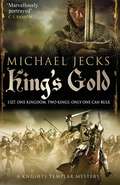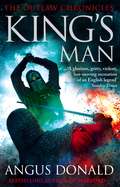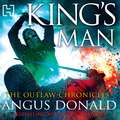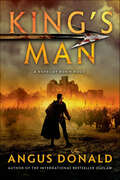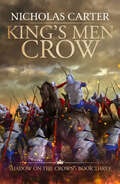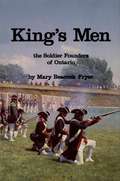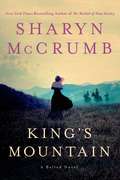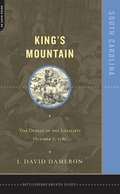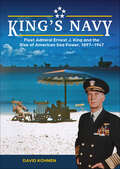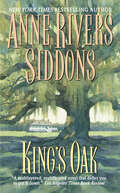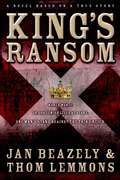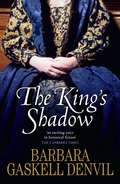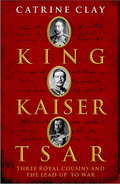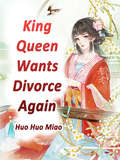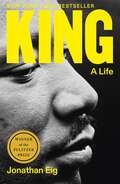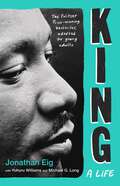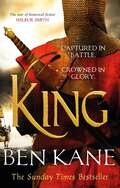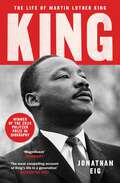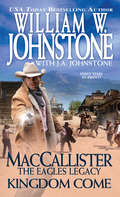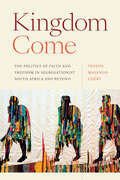- Table View
- List View
King's Gold (Medieval West Country Mystery #30)
by Michael JecksAs the year 1326 draws to a close, London is in flames. King Edward II is a prisoner, and the forces of his vengeful queen, Isabella, and her lover Sir Roger Mortimer, are in the ascendant. The Bardi family, bankers who have funded the King, must look to their future with the Queen, steering a careful course between rival factions -- if, that is, they can keep themselves alive. Others, too, find their loyalties torn. Guarding the deposed King on behalf of Mortimer, Sir Baldwin de Furnshill and bailiff Simon Puttock find themselves entangled in a tightening net of conspiracy, greed, betrayal and murder.
King's Man (Outlaw Chronicles #3)
by Angus DonaldTHE THIRD CRUSADE IS OVER Richard the Lionheart is bound for England. But with all the princes of Europe united against him . . . can the greatest warrior in Christendom make it safely home?THE LION IS CHAINED Captured. Bound. Imprisoned. King Richard's slim hope of salvation rests on one man - a former outlaw, a vengeful earl, a man who scoffs at Holy Mother Church:ROBIN HOOD For King and country Robin and his loyal lieutenant Alan Dale will risk all - from blood-soaked battlefields to deadly assassins - to see the Lionheart restored to his rightful throne.
King's Man (Outlaw Chronicles #3)
by Angus DonaldTHE THIRD CRUSADE IS OVER Richard the Lionheart is bound for England. But with all the princes of Europe united against him . . . can the greatest warrior in Christendom make it safely home?THE LION IS CHAINED Captured. Bound. Imprisoned. King Richard's slim hope of salvation rests on one man - a former outlaw, a vengeful earl, a man who scoffs at Holy Mother Church:ROBIN HOOD For King and country Robin and his loyal lieutenant Alan Dale will risk all - from blood-soaked battlefields to deadly assassins - to see the Lionheart restored to his rightful throne.
King's Man: A Novel of Robin Hood (The Outlaw Chronicles #3)
by Angus DonaldThe acclaimed author of Outlaw delivers a “rip-roaring tale of a young follower of Robin Hood and their mission to rescue King Richard” (Kirkus Reviews).In 1192 A.D., with the Third Crusade over, Richard the Lionheart is headed back home to England, only to be betrayed, captured, and held for ransom. Now with the princes of Europe lining up against him, the fate of the greatest warrior in Christendom lies in the hands of a renegade earl and former outlaw: Robin Hood.The mission is deadly and the enemies are powerful and numerous. But for king and country, Robin and his loyal lieutenant Alan Dale will face great risks—from battles on blood-soaked fields to deadly assassins—in a heroic bid to restore the Lionheart to his rightful throne.
King's Men Crow (The Shadow on the Crown)
by Nicholas CarterA historical adventure novel during the First English Civil War featuring two military officers who battle on and off the field in both love and war. August, 1643: the Siege of Gloucester continues. Can the weak city walls really survive against the might of the Royalists? William Sparrow and Hugo Telling may be on different sides, but their dreams and desires are the same. To find the courage to fight proudly and lead their men. For the war to be over and for the love of the incomparable Bella. But only one side can win the war, and only one man can win Bella&’s heart . . . King&’s Men Crow is the thrilling third installment of The Shadow on the Crown series. Praise for the writing of Nicholas Carter: &“Ringing to the clash of blades and the roar of cannon and pungent with the whiff of gunpowder . . . A storming read.&” —Peterborough Telegraph &“Carter&’s stories are in a league of their own.&” —Bristol Observer
King's Men: The Soldier Founders of Ontario
by Mary Beacock FryerKing’s Men is the story of the Loyalist regiments who became the soldier founders of the Province of Ontario, the Loyal Colonials who joined the Provincial Corps of the British Army, Canadian Command, during the American revolution. Mythology on the United Empire Loyalists who founded two Canadian provinces is ingrained. We often envisage loyal families marching out of the victorious United States at the close of the American Revolution. But these myths lead us to overlook a fascinating period in the lives of one group of Loyalists – the soldiers who became Ontario’s founders. By the time the Treaty of Separation was signed in 1783, four full strength corps were serving in Canada. These were the Royal Highland Emigrants (placed on the regular establishment in 1778, as the 84th Foot), the King’s Royal Regiment of New York, Butler’s Rangers, and the Loyal Rangers. A fifth corps, the King’s rangers amounted to three full companies. A detailed study on what these Provincials achieved is long overdue. King’s Men fills a gap in tracing the lives of these United Empire Loyalists who first fought under British command, and spent a difficult period as displaced persons in Canada (people whose only desire was to return to their homes in Britain’s older colonies) till the time when they accepted Canada as a new homeland.
King's Mountain: A Ballad Novel
by Sharyn MccrumbPeppered with lore and the authentic heart of the people in McCrumb's classic Ballads, this is an epic book that paints the brave action of John Sevier and his comrades against a landscape of richly portrayed characters. Harrowing battle descriptions compete with provoking family histories, as McCrumb once again shares history and legend like no one else. Both a novel of war and family, crafted with heart and depth,King's Mountain celebrates one of Appalachia's finest hours.
King's Mountain: The Defeat of the Loyalists, October 7, 1780
by J. David DameronIn the summer of 1780, while British troops roamed the southern countryside striking fear into the hearts of rebels, a hardy group of "over-the-mountain men" from Tennessee vowed to defend their families and farms. <P><P>At Kings Mountain, in northwest South Carolina, this small volunteer contingent of frontiersmen met the British in early October. The American victory there forced the British to retreat and turned the tide in the American Revolution's southern campaign.
King's Navy: Fleet Admiral Ernest J. King and the Rise of American Sea Power, 1897–1947
by David KohnenAn authoritative account of the rise and fall of American sea power between 1897 and 1947 and the definitive biography of Fleet Admiral Ernest J. King. Between 1897 and 1945 the US Navy rose to lofty heights, with huge manpower, a lavish roster of ships, and a hard-earned reputation for professionalism and potency. By 1947, in the wake of the Second World War, the Navy, although still powerful, had been significantly scaled down; much of the senior leadership retired and the wartime edge gradually dulled. This period from 1897 to 1947 was witnessed and to a large degree driven and determined by two admirals, Ernest J. King and King's mentor William S. Sims. These admirals were empowered by two giants of American political and military history, Presidents Theodore Roosevelt and Franklin D. Roosevelt. Through the lives of King, Sims, and the Roosevelts, Naval War College historian David Kohnen has crafted a sweeping history of American sea power from 1897 to 1947. This epic work was made possible through 20 years of research and writing. By accessing undiscovered and recently declassified source material, along with the full cooperation of the King and Sims families, the author has been able to tell new stories and draw fresh conclusions, making this volume a must-have for scholars of naval history.
King's Oak
by Anne Rivers SiddonsHe would make her whole againLeaving behind a disastrous marriage, Andy Calhoun moves to the small town of Pemberton, Georgia, "in search of banality." What she discovers, though, is not serenity, but Tom Dabney, a passionate and magical man.An exuberant poet who worships the wilderness surrounding Pemberton, Tom is everything Andy doesn't need in her life right now. But despite warnings from friends, Andy is soon deeply immersed in Tom's life and his world . . . a world he will do anything to protect. When Tom declares war on the enemy poisoning his woods, it becomes clear that Andy must choose between her life with Tom and the one she left behind . . . if Pemberton society will take her back.
King's Ransom
by Jan Beazely Thom LemmonsThe Faith to Face Tyranny Faith to Face the Third Reich Two Stories of Undaunted Courage Set during the darkest days of World War II,King’s Ransomtells the heroic story of Tsar Boris III, King of Bulgaria, and his extraordinary efforts to save his country’s Jewish population from Hitler’s concentration camps. Aware of the price he might pay for his risks, Boris faced the Third Reich with courage and resolve, firm in his Christian convictions that would not permit him to abandon nearly 50,000 Jews. Boris, along with members of the Orthodox Church, Jewish religious leaders, and others, ultimately ensured that no Bulgarian Jews lost their lives to Hitler’s regime. Based on a True Story Historically accurate, Boris’s quest to save Bulgaria’s Jews is interwoven with the love story of Daria, the Jewish attendant to the Bulgarian royal family, and Dobri, a sergeant in the king’s guard. With courageous characters and passionate storytelling,King’s Ransomreveals how individuals acting on faith can change the course of history. From the Trade Paperback edition.
King's Shadow
by Barbara Gaskell DenvilAndrew Cobham is a man of unconventional behaviour, his home is unusually grand, and he answers no questions. But as he keeps his own secrets safe, so he works to uncover those of others.It is 1483 and King Edward IV wears England's crown, but no king rules unchallenged. Often it is those closest to him who are the unexpected danger. When the king dies suddenly without clear cause, then rumour replaces fact - and Andrew Cobham is already working behind the scenes.Tyballis, when orphaned young, was forced into marriage with her neighbour, a bully and a simpleton. When she escapes his abuse, she meets Andrew Cobham, and gradually an uneasy alliance forms. Their friendship will take them in unusual directions as Tyballis becomes embroiled in Andrew's work and the danger which surrounds him.Eventually it is a motley gathering of thieves, informers, prostitutes and children that joins the game, determined to help Andrew uncover treason. And as the country is brought to the brink of war, Andrew and Tyballis discover something neither thought was possible.A thrilling story of abduction, murder and subterfuge by one of Australia's finest historical writers.
King, Kaiser, Tsar
by Catrine ClayDuring the last days of July 1914 telegrams flew between the King, the Kaiser and the Tsar. George V, Wilhelm II and Nicholas II, known in the family as Georgie, Willy and Nicky, were cousins. Between them they ruled over half the world. They had been friends since childhood. But by July 1914 the Trade Union of Kings was falling apart. Each was blaming the other for the impending disaster of the First World War. 'Have I gone mad ' Nicky asked his wife Alix in St Petersburg, showing her another telegram from Willy. 'What on earth does William mean pretending that it still depends on me whether war is averted or not!' Behind the friendliness of family gatherings lurked family quarrels, which were often played out in public. Drawing widely on previously unpublished documents, this is the extraordinary story of their overlapping lives, conducted in palaces of unimaginable opulence, surrounded by flattery and political intrigue. And through it runs the question: to what extent were the King, the Kaiser and the Tsar responsible for the outbreak of the war, and, as it turned out, for the end of autocratic monarchy
King, Kaiser, Tsar: Three Royal Cousins Who Led The World To War
by Catrine ClayDuring the last days of July 1914 telegrams flew between the King, the Kaiser and the Tsar. George V, Wilhelm II and Nicholas II, known in the family as Georgie, Willy and Nicky, were cousins. Between them they ruled over half the world. They had been friends since childhood. But by July 1914 the Trade Union of Kings was falling apart. Each was blaming the other for the impending disaster of the First World War. 'Have I gone mad ' Nicky asked his wife Alix in St Petersburg, showing her another telegram from Willy. 'What on earth does William mean pretending that it still depends on me whether war is averted or not!' Behind the friendliness of family gatherings lurked family quarrels, which were often played out in public. Drawing widely on previously unpublished documents, this is the extraordinary story of their overlapping lives, conducted in palaces of unimaginable opulence, surrounded by flattery and political intrigue. And through it runs the question: to what extent were the King, the Kaiser and the Tsar responsible for the outbreak of the war, and, as it turned out, for the end of autocratic monarchy
King, Queen Wants Divorce Again!: Volume 1 (Volume 1 #1)
by Huo HuoMiaoShe was the daughter of a renowned imperial merchant, yet she had failed miserably in the hands of the scum man and the concubine girl. Not only was the whole family executed, they were even burned to death in the Sky Prison.When she had to live a new life, she had to make every step of the way. However, when she sought to ensure the safety of the Su Clan, she found a prince who openly desired to marry into the Dark Alliance.However, in this business, she was an expert. She would never lose anything. If she didn't want to be an idiot, then so be it.Unexpectedly, the business grew bigger and bigger, eventually becoming a queen.Su Zixuan: I want Li!Eunuch and palace maid: Empress, think twice!Su Zixuan: I don't care! I want to leave!Eunuch and palace maid: "Your Majesty!" The empress wants to leave again!Your Majesty: Let's go back to the sleeping quarters and have a talk.
King, Queen Wants Divorce Again!: Volume 2 (Volume 2 #2)
by Huo HuoMiaoShe was the daughter of a renowned imperial merchant, yet she had failed miserably in the hands of the scum man and the concubine girl. Not only was the whole family executed, they were even burned to death in the Sky Prison.When she had to live a new life, she had to make every step of the way. However, when she sought to ensure the safety of the Su Clan, she found a prince who openly desired to marry into the Dark Alliance.However, in this business, she was an expert. She would never lose anything. If she didn't want to be an idiot, then so be it.Unexpectedly, the business grew bigger and bigger, eventually becoming a queen.Su Zixuan: I want Li!Eunuch and palace maid: Empress, think twice!Su Zixuan: I don't care! I want to leave!Eunuch and palace maid: "Your Majesty!" The empress wants to leave again!Your Majesty: Let's go back to the sleeping quarters and have a talk.
King, Queen Wants Divorce Again!: Volume 3 (Volume 3 #3)
by Huo HuoMiaoShe was the daughter of a renowned imperial merchant, yet she had failed miserably in the hands of the scum man and the concubine girl. Not only was the whole family executed, they were even burned to death in the Sky Prison.When she had to live a new life, she had to make every step of the way. However, when she sought to ensure the safety of the Su Clan, she found a prince who openly desired to marry into the Dark Alliance.However, in this business, she was an expert. She would never lose anything. If she didn't want to be an idiot, then so be it.Unexpectedly, the business grew bigger and bigger, eventually becoming a queen.Su Zixuan: I want Li!Eunuch and palace maid: Empress, think twice!Su Zixuan: I don't care! I want to leave!Eunuch and palace maid: "Your Majesty!" The empress wants to leave again!Your Majesty: Let's go back to the sleeping quarters and have a talk.
King, Queen Wants Divorce Again!: Volume 4 (Volume 4 #4)
by Huo HuoMiaoShe was the daughter of a renowned imperial merchant, yet she had failed miserably in the hands of the scum man and the concubine girl. Not only was the whole family executed, they were even burned to death in the Sky Prison.When she had to live a new life, she had to make every step of the way. However, when she sought to ensure the safety of the Su Clan, she found a prince who openly desired to marry into the Dark Alliance.However, in this business, she was an expert. She would never lose anything. If she didn't want to be an idiot, then so be it.Unexpectedly, the business grew bigger and bigger, eventually becoming a queen.Su Zixuan: I want Li!Eunuch and palace maid: Empress, think twice!Su Zixuan: I don't care! I want to leave!Eunuch and palace maid: "Your Majesty!" The empress wants to leave again!Your Majesty: Let's go back to the sleeping quarters and have a talk.
King: A Life
by Jonathan EigWINNER OF THE 2024 PULITZER PRIZE FOR BIOGRAPHYA finalist for the 2023 National Book Critics Circle Award | Named one of the ten best books of 2023 by The Washington Post, Chicago Tribune, and TimeA New York Times bestseller and notable book of 2023 | One of Barack Obama’s favorite books of 2023One of The New Yorker’s essential reads of 2023 | A Christian Science Monitor best book of the year | One of Air Mail’s twelve best books of 2023A Washington Post and national indie bestseller | One of Publishers Weekly’s best nonfiction books of 2023 | One of Smithsonian magazine’s ten best books of 2023“Supple, penetrating, heartstring-pulling and compulsively readable . . . Eig’s book is worthy of its subject.” —Dwight Garner, The New York Times (Editors’ Choice)“[King is] infused with the narrative energy of a thriller . . . The most compelling account of King’s life in a generation.” —Mark Whitaker, The Washington Post“No book could be more timely than Jonathan Eig’s sweeping and majestic new King . . . Eig has created 2023′s most vital tome.” —Will Bunch, The Philadelphia InquirerHailed by The New York Times as “the new definitive biography,” King mixes revelatory new research with accessible storytelling to offer an MLK for our times.Vividly written and exhaustively researched, Jonathan Eig’s King: A Life is the first major biography in decades of the civil rights icon Martin Luther King Jr.—and the first to include recently declassified FBI files. In this revelatory new portrait of the preacher and activist who shook the world, the bestselling biographer gives us an intimate view of the courageous and often emotionally troubled human being who demanded peaceful protest for his movement but was rarely at peace with himself. He casts fresh light on the King family’s origins as well as MLK’s complex relationships with his wife, father, and fellow activists. King reveals a minister wrestling with his own human frailties and dark moods, a citizen hunted by his own government, and a man determined to fight for justice even if it proved to be a fight to the death. As he follows MLK from the classroom to the pulpit to the streets of Birmingham, Selma, and Memphis, Eig dramatically re-creates the journey of a man who recast American race relations and became our only modern-day founding father—as well as the nation’s most mourned martyr.In this landmark biography, Eig gives us an MLK for our times: a deep thinker, a brilliant strategist, and a committed radical who led one of history’s greatest movements, and whose demands for racial and economic justice remain as urgent today as they were in his lifetime.Includes 8 pages of black-and-white photographs
King: A Life (Young Adult Edition)
by Jonathan EigHailed as “the most compelling account of [Martin Luther] King’s life in a generation” by the Washington Post, the Pulitzer Prize–winning bestseller is now adapted for young adults in this new standard biography of the most famous civil rights activist in American History. Often regarded as more of a myth and legend than man, the Reverend Dr. Martin Luther King Jr. was many things throughout his storied life: student, activist, preacher, dreamer, father, husband. From his Atlanta childhood centered in the historically Black neighborhood of Sweet Auburn to his precipitous rise as a civil rights leader on the streets of Birmingham, Selma, and Montgomery, Dr. King would go on to become one of the most recognizable, influential, and controversial persons of the twentieth century.In this fast-paced and immersive adaptation of Jonathan Eig’s groundbreaking New York Times bestseller readers will meet a Dr. King like no other: a committed radical whose demands for racial and economic justice remain as urgent today as they were in his lifetime, a minister wrestling with his human frailties and dark moods, a citizen hunted by his own government.The inspiring young adult edition of King: A Life highlights the author’s never-before-seen research—including recently declassified FBI documents—while reaffirming and recontextualizing the lasting effects and implications of MLK’s work for the present day. Adapted by National Book Award–nominated authors Yohuru Williams and Michael G. Long, this biography for a new generation is a nuanced, unprecedented portrayal of a man who truly shook the world.Accolades and Praise for King: A Life: Pulitzer Prize WinnerA New York Times, Washington Post, and Indie BestsellerA National Book Award Nominee One of Barack Obama’s Favorite Books of the Year A National Book Critics Circle Award Finalist A “Best Book of the Year” from New York Times ● Washington Post ● TIME Magazine ● The New Yorker ● Publishers Weekly ● The Chicago Tribune ● Smithsonian Magazine ● Christian Science Monitor ● Air Mail“Supple, penetrating, heartstring-pulling and compulsively readable . . . Eig’s book is worthy of its subject.” —New York Times “No book could be more timely than Jonathan Eig’s sweeping and majestic new King.” —Philadelphia Inquirer
King: A rip-roaring epic adventure novel of one of history’s greatest warriors by the Sunday Times bestselling author
by Ben KaneThe thrilling adventure story about history's greatest warrior: Richard the Lionheart Autumn 1192. At the end of the Third Crusade Jerusalem remains in the Saracens' hands, and a peace treaty is agreed with their leader Saladin. Richard the Lionheart is finally free to travel to England and restore peace to his kingdom, under threat from his treacherous brother John. However, the epic journey will test every limit of his endurance as it takes him deeper into lands controlled by his enemies. He is ultimately captured near Vienna, imprisoned for three years, which further fans the flames of unrest in England and beyond. If he finally returns home, what will remain of his kingdom? And what deadly price must he pay to restore order?
King: A rip-roaring epic adventure novel of one of history’s greatest warriors by the Sunday Times bestselling author
by Ben KaneThe thrilling adventure story about history's greatest warrior: Richard the Lionheart Autumn 1192. At the end of the Third Crusade Jerusalem remains in the Saracens' hands, and a peace treaty is agreed with their leader Saladin. Richard the Lionheart is finally free to travel to England and restore peace to his kingdom, under threat from his treacherous brother John. However, the epic journey will test every limit of his endurance as it takes him deeper into lands controlled by his enemies. He is ultimately captured near Vienna, imprisoned for three years, which further fans the flames of unrest in England and beyond. If he finally returns home, what will remain of his kingdom? And what deadly price must he pay to restore order?
King: The Life of Martin Luther King
by Jonathan EigThe compelling story of Martin Luther King's life and achievements has become simplified and domesticated in a way that fails to do full justice to his radical vision and importance. Now, in King, we get the most comprehensive and complete portrait ever written about this iconic figure. The first major new biography of Martin Luther King Jr in over 40 years, Jonathan Eig's superb King is based on years of research, hundreds of interviews with those who knew him and many thousands of previously unreleased documents, including a huge cache from the FBI. Eig reveals King's story to be more compelling and more complex than we knew. For too long, his radical vision for the future has been erased. The hope of his 'I have a dream' message and the tragedy of his assassination at the age of 39 have overwhelmed the story of a brilliantly bold and complicated man, which obscures his real significance of today's society and for the future. His vision went far beyond achieving equal treatment for black men and women, which was only a part of a much greater and more wide-ranging mission - something that has been forgotten by most. Eig's fascinating biography not only shines new light on King's remarkable career, but also humanises him so that he becomes more than a symbol of hope and defiance, but a man with flaws, a sense of humour, as a father and a husband. It's an essential read for our times.
Kingdom Come (A Duff MacCallister Western #5)
by William W. Johnstone J.A. JohnstoneUSA Today-Bestselling Author:When a family member falls victim to a cutthroat gang in Texas, a Wyoming rancher hits the road ready for war…Standing for family, honor, and a way of life, the MacCallisters have carved out a hard-won corner of the Wyoming frontier. In the thrilling new novel from the bestselling Western writers, Duff MacCallister faces his most treacherous and deadly fight yet.Kingdom Come Like a murderous plague, a band of cutthroats and criminals, led by prison escapees from New Mexico, rages through West Texas. They're slaughtering everyone in their path: men, women and children. They struck at Saragosa. Now they've taken over the town of Boracho. The Dallas newspapers call them the Kingdom Come Gang. In Chugwater, Wyoming, Duff McCallister calls them his enemy. Because one of their victims was family.Now it's personal Riding to Texas, Duff gathers every man he can to make an assault on Boracho, even using a hardcase recruited from behind bars. Facing a brutal, merciless enemy, with innocent hostages caught in between, Duff is soon in a full blast war, with guns, knives, and dynamite exploding on dirt streets soaked in blood. And it won't be over until a hero makes a final stand.
Kingdom Come: The Politics of Faith and Freedom in Segregationist South Africa and Beyond (Religious Cultures of African and African Diaspora People)
by Tshepo Masango ChéryIn Kingdom Come, Tshepo Masango Chéry charts a new genealogy of early twentieth-century Black Christian activists who challenged racism in South Africa before the solidification of apartheid by using faith as a strategy against global racism. Masango Chéry traces this Black freedom struggle and the ways that South African church leaders defied colonial domination by creating, in solidarity with Black Christians worldwide, Black-controlled religious institutions that were geared toward their liberation. She demonstrates how Black Christians positioned the church as a site of political resistance and centered specifically African visions of freedom in their organizing. Drawing on archival research spanning South Africa, Zimbabwe, Kenya, the United Kingdom, and the United States, Masango Chéry tells a global story of the twentieth century that illuminates the formations of racial identity, state control, and religious belief. Masango Chéry’s recentering of South Africa in the history of worldwide Black liberation changes understandings of spiritual and intellectual routes of dissemination throughout the diaspora.
